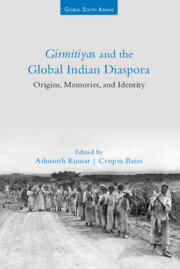5 - Ageing Girmitiyas and The Story of Salt Behind The Sugar
Published online by Cambridge University Press: 20 April 2024
Summary
Old age and ageing are categories that can ground anthropological reflection on ways of living. Anthropological inquiries into old age have also contributed to ethnographic practice: participant observation, the use of biographies, individual trajectories and audio-visual narratives form part of the research legacy of anthropological literature on old age. Evolving forms of social and spiritual care for geriatric needs reflect complex and diverse transformations in any era. This chapter points out that the existing literature on plantationbased indentured Indians is yet to feature detailed studies on ageing and the factors that may have accelerated the process. Additionally, there is a dearth of studies on the social-care networks that came into being to provide for the elderly once the indenture system was abolished and/or free living outside of the plantations started. While striving to fill this gap, this chapter endeavours to open up themes for further research.
RETHINKING ‘AGEING’ AMONG THE GIRMITIYAS
In the nineteenth to early twentieth centuries, the indenture system was used to recruit Asian workers for employment elsewhere in the European colonies. Despite the end of slavery, the British Empire's quest to make sugar and keep it profitable continued. It was a major source of governmental revenue, and consumer demand increased as the masses developed a taste for this labourintensive commodity, using it to sweeten tea and coffee all over Europe. As a layered, divisive and discriminatory process, indenture steadily revealed the global division of labour as well as the scale of exploitation of the body that went along with it. The physical sweat and toil accompanied by regimes of bodily control not only became the salt behind the success story of sugar production, but, I argue, these factors also hold the key to understanding the problems of ageing among the indentured and ex-indentured population.
Ageing in an era when longevity (as we know it now) was yet to be established as a fairly probable norm, provides us with a compelling context. The colonial perception of ‘ageing’ under indenture was shaped by economic needs: in the plantation system, older workers were a burden or a liability. Able-bodied individuals likely to perform well under harsh tropical conditions were preferred. Thirty-five was considered too old to re-migrate. Many aspiring migrants were rejected on ‘account of old age or some bodily infirmity’.
- Type
- Chapter
- Information
- Girmitiyas and the Global Indian DiasporaOrigins, Memories, and Identity, pp. 119 - 136Publisher: Cambridge University PressPrint publication year: 2024

